City Welcomes "Grass Roots" Ordinance Reform--Sometimes
A Closer Look at Two Ordinances Reveals That City’s Embrace of Citizen Activism Depends on Ordinance & Which Citizens Are Doing the Reforming
| The City’s apparent reluctance to fully partner with citizen advocates for stronger historic preservation – including the Commission’s unwillingness (so far) to grant a hearing to the City’s own consultant – has troubled local preservationists.
The uneasy relationship between the City and an informal Historic Preservation citizens’ advisory panel contrasts strongly with the close working relationship between the City and the citizen advisory panel headed by Patrick Chapin and attorney Frank Hamner that worked closely with the Planning department and the City Commission to craft a new Fine Dining Ordinance. The Fine Dining panel’s recommendations were heard by the City’s Planning and Zoning Board as well as the full City Commission. Their recommendations formed the basis of the City’s new Fine Dining ordinance which was adopted in September, 2013. There are similarities in the paths taken by each group in their attempts to amend a City ordinance – similarities that include months of meetings, resolution of conflicting views and interaction with City Boards. However, the contrast between the City’s treatment of the Fine Dining and Historic Preservation panels is striking. Fine Dining Panel Receives Kudos All Around & Full City Cooperation. By any measure, Chamber of Commerce President Patrick Chapin would be considered a City Hall insider. Mr. Chapin sits on the Economic Development Advisory Board (EDAB) and also represents the interests of the Park Avenue Merchants’ Association in frequent testimony before the City Commission. Mr. Chapin’s partner on the Panel was Frank Hamner, a local attorney representing the interests of the Holler family – a prominent Park Avenue landowner. The panel also included other Chamber members. Mr. Hamner successfully lobbied City Hall to permit two fast food chains, Burger Fi and Firehouse Subs, to occupy Park Avenue retail space owned the Hollers. However, before and after the Firehouse Subs deal was closed, Mr. Hamner continued to work with Mr. Chapin to close the door to all future fast food chains on the Avenue. City email records obtained by the Voice show that high-level staffers at City Hall – Director of Planning and Community Development Dori Stone and Planning Manager Jeff Briggs – corresponded frequently with Hamner and Chapin on a range of matters, including Fine Dining, during an 8 month period between May and December, 2013. Our count of the emails exchanged among Chapin, Hamner, Briggs and Stone in various combinations shows that more than 100 emails were exchanged. Various public statements from City officials and their accommodation of the panel’s interest in appearing before key City boards confirmed that the City welcomed the involvement and leadership of Chapin and Hamner in changing the Fine Dining Ordinance. The panel’s draft of proposed ordinance changes was ultimately accepted as the template for the new ordinance that was overwhelmingly approved by the Planning and Zoning Board and the City Commission. Jeff Briggs applauded the efforts of the Chapin/Hamner panel in his introduction to the panel’s presentation of its proposal to Planning & Zoning on 8/6/13:
After the panel received the unanimous approval of P&Z, they moved on to the City Commission on 8/26/13 and, again, presented their findings and recommendations. Mayor Bradley welcomed the panel:
Historic Preservation Panel Encounters “Roadblocked” Board & Uncertain Commitment from City. Betsy Owens is one of the leaders of the group that is seeking a voice in the City’s revamp of its Historic Preservation ordinance. Ms. Owens is the Executive Director of Casa Feliz, a major historic landmark in the city of Winter Park. Ms. Owens and other preservation-minded citizens are part of a group – the Friends of Casa Feliz Preservation Advocacy Committee – formed to promote ordinance changes that will provide stronger protection of Winter Park’s historic homes and neighborhoods. The relationship between Winter Park’s citizen preservationists and City government is far more complicated than the relationship between the City and the Fining Dining Panel. The relationship hit a low point last summer when the City issued a demolition permit for Capen House several months after the City Commission voted unanimously – in a six minute hearing – to strip the historic home of its protected status. The essence of that decision, which was rendered on behalf of SunTrust bank’s interest in the foreclosed house, was the protection of “property rights” vs. a community’s interest in preserving its cultural heritage. Since that time, preservationists and City officials have struggled to resolve the “property vs. community rights” issue in numerous Historic Preservation Board hearings. Even though the informal advisory panel has submitted research and recommendations, testified before the HPB on multiple occasions and talked with City officials, including the Mayor, they have never been able to get a commitment from the City that their concerns and recommendations will be considered – and acted on – in any manner resembling the reception afforded the Fine Dining Panel. Click the button below to view the HP Citizen Panel report.
Commission & HP Board Unwilling to Commit to Appearance by HP Expert & Citizen Panel. Preservationists have been unable to secure a promise from the Commission that either they or the City’s own consultant will be able to present their findings and recommendations directly to the City Commission, as was the case with the Fine Dining Panel. Instead, the Mayor – with the support of Commissioners Steve Leary and Sarah Sprinkel – has insisted that the panel and consultant interact primarily with the HPB, which will consider input from the consultant and the panel, then create a report of its own for presentation to the Commission.
The Commission’s decision not to deal directly with the Historic Preservation citizen panel – and conflicting opinions among HPB members on questions of property rights and whether historic preservation enhances home values, have created discord between the board and citizen preservationists. Preservationists also question the qualifications of some on the board. However, one opinion that board members and preservationists seem to share is that Lindsey Hayes, the City’s sole preservation-oriented staffer, is a well-qualified, passionate advocate for preservation. Even though preservationists have had numerous contacts with Lindsey Hayes and a few meetings with Ms. Hayes’ supervisor Dori Stone, our requested search of all email correspondence among Owens and Dori Stone and dept. manager Jeff Briggs between May and December, 2013, showed no evidence of the Historic Preservation Citizen Panel receiving the sort of significant ongoing contact and support these high-level staffers offered the Fine Dining Citizen Panel. As department Director, Dori Stone is ultimately responsible for working with City Manager Randy Knight to ensure that HPB findings are presented to the City Commission. However, that presentation – originally scheduled for October/November of this year – has now been pushed to the middle of 2014. Is Preservation Ordinance Reform Imperiled by Board’s Fear of Commission Displeasure? Lack of support at the highest levels in the City appears to be a factor in the uncertain pace of Historic Preservation review. HPB workload and “careful treading” are also factors. In an HPB workshop on October 9, 2013, HPB Chair Randall Glidden remarked that a set of past recommendations had hit a “roadblock” with the Commission because some Commissioners had objected to recommendations related to creation of Historic Districts in the City. Does City Historic Preservation Board See Itself as City Commission’s Agent or Its Advisor? During the workshop, Mr. Glidden suggested that because the board’s work involves policy considerations, it is appropriate for the HPB to “. . . go up the line to the City Commission” to find out from them “. . . what do you want to see? How do you want the historic resources of the City of Winter Park to be protected? What levels do you want to go to?’’ Mr. Glidden’s assertion triggered a question from audience member Pat McDonald seeking clarification of how the HPB sees its relationship with the City Commission:
Mr. Glidden indicated that the HPB had even considered “removing” some recommended changes to make their findings more palatable to the Commission. During the workshop, Chairman Glidden and board member Genean McKinnon balked at suggestions that the work of the citizen panel should be presented directly to the Commission with Ms. McKinnon suggesting that the HPB’s report deadline made presentation of the citizen panel’s report to the Commission problematic. Mr. Glidden added that “I just think multiple recommendations prior to this board making their recommendation may be confusing. And, it kind of jumps the process.” Who Were the “Back Channel” Influencers Who Caused the HPB to Ditch HP Ordinance Recommendations in 2012? During the October 9 workshop, in response to intense questioning by preservationist Aimee Spencer, Mr. Glidden admitted that in March 2012, a male Commissioner had communicated to him that board-recommended changes were unacceptable, giving Glidden the impression that the board’s 2012 ordinance changes “wouldn’t fly” with the Commission due to “property rights” objections. The exchange between the board chair and the Commissioner took place immediately after the P&Z board voted unanimously to accept the board’s recommendations on March 6, 2012. Chairman Glidden described his encounter with the Commissioner after the P&Z meeting saying, “In talking to him [ the Commissioner ] after, I could see that we were going to have a problem . . .” It is this input and similar comments apparently passed on to Glidden by Randy Knight and others through “back channels” in 2012 that accounted for the withdrawal of the board’s Historic Preservation ordinance recommendations from consideration at that time.
As shown in the 10/9 workshop video, preservationists and other citizens are continuing to ask for an opportunity to directly address the City Commission to present their views and suggestions – and those of the City‘s expert consultant. Despite Commission efforts to keep citizen and consultant testimony largely confined to the HPB, even City staffers had assumed that the Commission would – as a first step in consideration of ordinance changes – hear direct testimony from the City’s own Historic Preservation consultant, but a majority of the Commission rejected that option in November. Video excerpts (included in part one of this story) of Commissioners debating the merits of allowing the City’s Historic Preservation consultant to share his research and recommendations with them illustrates the ideological and procedural fault lines along which the Commission is still divided – fault lines that the Fine Dining Panel somehow managed to straddle, but which have so far proved impassable to advocates in the Historic Preservation community.
Note: We have changed the text of this article to correctly identify Ms. Betsy Owens by her proper surname.
|
|||||||||||||||||||

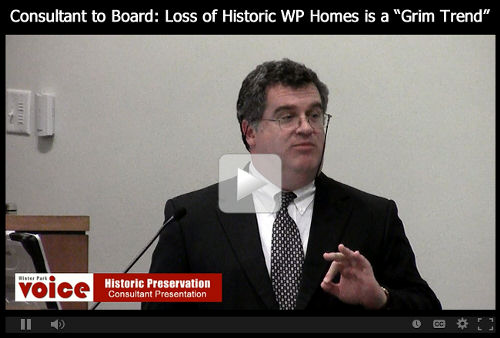
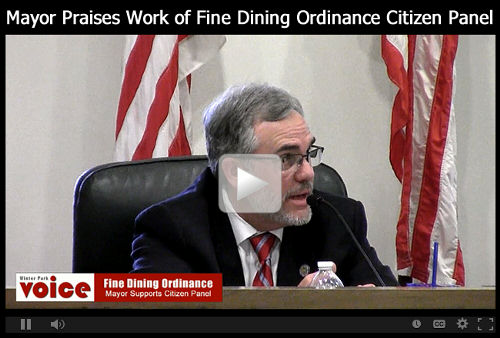
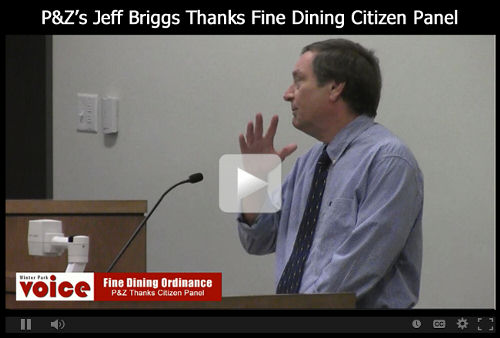
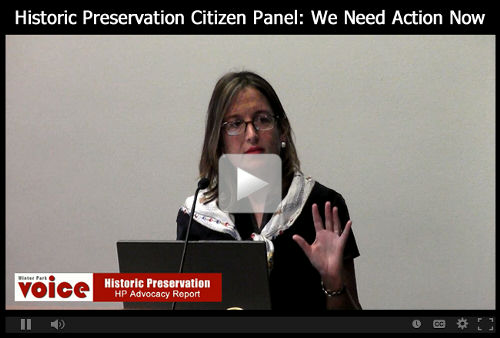
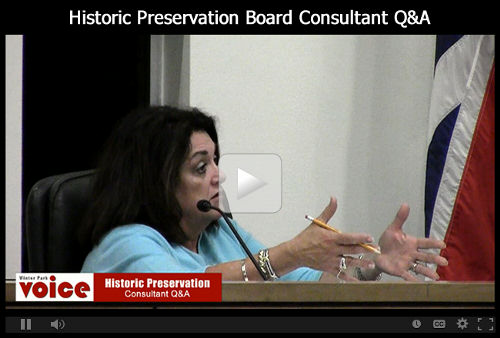
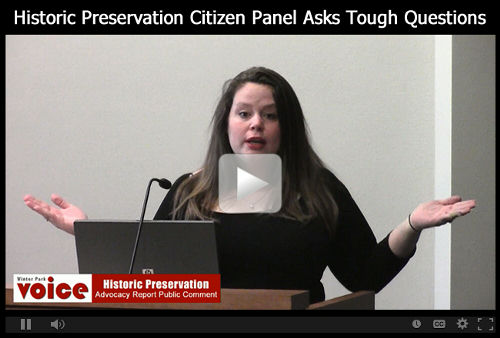
Recent Comments